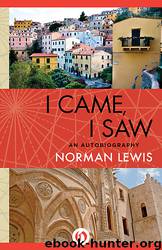I Came, I Saw by Norman Lewis

Author:Norman Lewis [Lewis, Norman]
Language: eng
Format: epub
ISBN: 978-1-4804-3332-8
Publisher: Open Road Media
Published: 2013-06-12T17:49:00+00:00
Chapter Thirteen
NOTHING COULD HAVE been more remote than the sound of battle in Havana. Secretly, too, nothing could have caused more joy to the small percentage of Cubans who in reality owned the country than the news that war had finally been declared. The large British community besieged their Embassy, demanding to be enrolled in any capacity in the defence of their country, and the Embassy paid tribute to their patriotism in an announcement in the Havana Post, adding a recommendation, that they carry on, while maintaining watchful calm, with whatever they happened to be doing at that time in Cuba. The posture was to be one of heroic readiness.
The dismantling of Poland occupied here, as elsewhere, the headlines for a few days, before relegation to the back pages. Apart from lack of any real interest in such a remote country, there were more important subjects for public discussion. As a general rule, the only time when countries producing raw materials can expect a good or even fair price for their production is when a major war is being fought. Cuba depended entirely on sugar, produced largely under American control and sold almost exclusively to the United States. The Americans had devised a system for keeping the Cubans under financial control, and thereby reducing prices. This was done by introducing a quota system by which Cuba had a fixed share of US sugar purchases, the rest going to other producers, and in three years alone, 1930—1933, the Cuban quota had been reduced from 50 per cent to 25 per cent.
The outbreak of war instantly and automatically put an end to this state of affairs, and even the visit to Havana of American film stars caused less excitement than the news, ten days after the German planes attacked Warsaw, that President Roosevelt had ordered the suspension of sugar quotas. Those who had pleaded to be allowed to sell even half the sugar they produced could now sit back calmly in the absolute certainty that there would be a scramble for surpluses held in warehouses. War bred shortages; armies in the field had to have sugar, and it was regarded as almost certain that Germany would enter the market. Acting as middlemen, the Americans were now prepared to take all the sugar they could get their hands on, and hardly had the bombs ceased to fall on Warsaw than the price shot up 1.5 cents a pound. Hope had returned to Cuba and the only slight remaining fear was that the Allies might come to an agreement with the Germans, causing the war to fizzle out.
Suddenly, with these rosy prospects, money had returned to circulation. The theatres were packed. Restaurant tables had to be booked days in advance, and rich men threw their half-smoked Coronas to the nearest beggar. Americans were flocking to Havana where it was forecast that the season would be the most brilliant on record. Temporary members enjoying a dip off the perfect beach at the Jaimanitas Club were served by waiters prepared to wade out into knee-depth water to bring them their drinks.
Download
This site does not store any files on its server. We only index and link to content provided by other sites. Please contact the content providers to delete copyright contents if any and email us, we'll remove relevant links or contents immediately.
Asking the Right Questions: A Guide to Critical Thinking by M. Neil Browne & Stuart M. Keeley(5765)
Autoboyography by Christina Lauren(5228)
Eat That Frog! by Brian Tracy(4527)
Dialogue by Robert McKee(4390)
Sticky Fingers by Joe Hagan(4190)
Journeys Out of the Body by Robert Monroe(3621)
Annapurna by Maurice Herzog(3464)
Full Circle by Michael Palin(3443)
Schaum's Quick Guide to Writing Great Short Stories by Margaret Lucke(3376)
Elements of Style 2017 by Richard De A'Morelli(3343)
The Art of Dramatic Writing: Its Basis in the Creative Interpretation of Human Motives by Egri Lajos(3063)
Atlas Obscura by Joshua Foer(2955)
Why I Write by George Orwell(2945)
The Fight by Norman Mailer(2930)
The Diviners by Libba Bray(2928)
In Patagonia by Bruce Chatwin(2922)
The Mental Game of Writing: How to Overcome Obstacles, Stay Creative and Productive, and Free Your Mind for Success by James Scott Bell(2906)
Venice by Jan Morris(2571)
The Elements of Style by William Strunk and E. B. White(2470)
